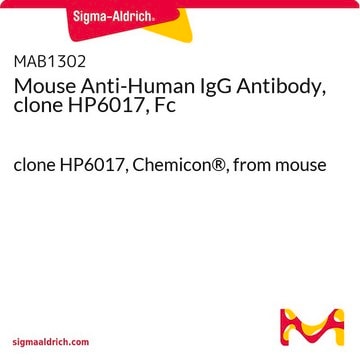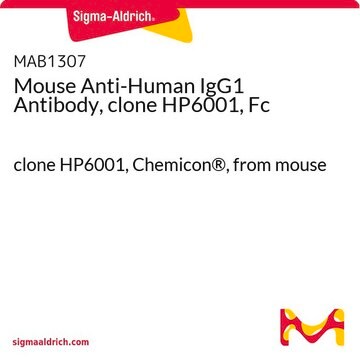MAB1308
Mouse Anti-Human IgG2 Antibody, clone HP6002, Fc
clone HP6002, Chemicon®, from mouse
Sinónimos:
Anti-Anti-CD32, Anti-Anti-CD32B, Anti-Anti-FCG2, Anti-Anti-FCGR2, Anti-Anti-FCGR2C, Anti-Anti-FcGRIIB, Anti-Anti-FcRII-c, Anti-Anti-FcgammaRIIb, Anti-Anti-IGFR2
About This Item
Productos recomendados
biological source
mouse
Quality Level
antibody form
purified immunoglobulin
antibody product type
secondary antibodies
clone
HP6002, monoclonal
species reactivity
human
manufacturer/tradename
Chemicon®
technique(s)
ELISA: suitable
radioimmunoassay: suitable
western blot: suitable
isotype
IgG1
NCBI accession no.
UniProt accession no.
shipped in
wet ice
target post-translational modification
unmodified
Gene Information
human ... FCGR2B(2213)
Categorías relacionadas
Specificity
human IgG subclass 4- 0.01% Isoelectric Focusing: mean pI 7.1
Application
Final working dilutions must be determined by end user.
Linkage
Physical form
Storage and Stability
Other Notes
Legal Information
¿No encuentra el producto adecuado?
Pruebe nuestro Herramienta de selección de productos.
Storage Class
10 - Combustible liquids
wgk_germany
WGK 2
flash_point_f
Not applicable
flash_point_c
Not applicable
Certificados de análisis (COA)
Busque Certificados de análisis (COA) introduciendo el número de lote del producto. Los números de lote se encuentran en la etiqueta del producto después de las palabras «Lot» o «Batch»
¿Ya tiene este producto?
Encuentre la documentación para los productos que ha comprado recientemente en la Biblioteca de documentos.
Nuestro equipo de científicos tiene experiencia en todas las áreas de investigación: Ciencias de la vida, Ciencia de los materiales, Síntesis química, Cromatografía, Analítica y muchas otras.
Póngase en contacto con el Servicio técnico







